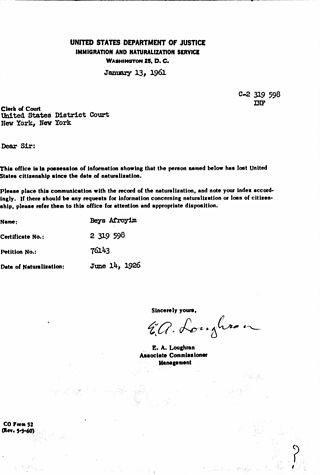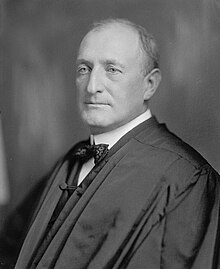United States v. Wong Kim Ark, 169 U.S. 649 (1898), was a landmark decision of the U.S. Supreme Court which held that "a child born in the United States, of parents of Chinese descent, who, at the time of his birth, are subjects of the Emperor of China, but have a permanent domicile and residence in the United States, and are there carrying on business, and are not employed in any diplomatic or official capacity under the Emperor of China", automatically became a U.S. citizen at birth. This decision established an important precedent in its interpretation of the Citizenship Clause of the Fourteenth Amendment to the Constitution.
Takao Ozawa v. United States, 260 U.S. 178 (1922), was a US legal proceeding. The United States Supreme Court found Takao Ozawa, a Japanese American who was born in Japan but had lived in the United States for 20 years, ineligible for naturalization. In 1914, Ozawa filed for United States citizenship under the Naturalization Act of 1906. This act allowed only "free white persons" and "persons of African nativity or persons of African descent" to naturalize. Ozawa did not challenge the constitutionality of the racial restrictions. Instead, he claimed that Japanese people should be properly classified as "free white persons".
Hamdan v. Rumsfeld, 548 U.S. 557 (2006), is a United States Supreme Court case in which the Court held that military commissions set up by the Bush administration to try detainees at Guantanamo Bay violated both the Uniform Code of Military Justice (UCMJ) and the Geneva Conventions ratified by the U.S.

The Supreme Court of the United States is the highest court in the federal judiciary of the United States. The procedures of the Court are governed by the U.S. Constitution, various federal statutes, and its own internal rules. Since 1869, the Court has consisted of one chief justice and eight associate justices. Justices are nominated by the president, and with the advice and consent (confirmation) of the U.S. Senate, appointed to the Court by the president. Once appointed, justices have lifetime tenure unless they resign, retire, or are removed from office.

Afroyim v. Rusk, 387 U.S. 253 (1967), was a landmark decision of the Supreme Court of the United States, which ruled that citizens of the United States may not be deprived of their citizenship involuntarily. The U.S. government had attempted to revoke the citizenship of Beys Afroyim, a man born in Poland, because he had cast a vote in an Israeli election after becoming a naturalized U.S. citizen. The Supreme Court decided that Afroyim's right to retain his citizenship was guaranteed by the Citizenship Clause of the Fourteenth Amendment to the Constitution. In so doing, the Court struck down a federal law mandating loss of U.S. citizenship for voting in a foreign election—thereby overruling one of its own precedents, Perez v. Brownell (1958), in which it had upheld loss of citizenship under similar circumstances less than a decade earlier.
United States citizenship can be acquired by birthright in two situations: by virtue of the person's birth within United States territory or because one or both of their parents was a U.S. citizen at the time of the person's birth. Birthright citizenship contrasts with citizenship acquired in other ways, for example by naturalization.
Boumediene v. Bush, 553 U.S. 723 (2008), was a writ of habeas corpus petition made in a civilian court of the United States on behalf of Lakhdar Boumediene, a naturalized citizen of Bosnia and Herzegovina, held in military detention by the United States at the Guantanamo Bay detention camps in Cuba. Guantánamo Bay is not formally part of the United States, and under the terms of the 1903 lease between the United States and Cuba, Cuba retained ultimate sovereignty over the territory, while the United States exercises complete jurisdiction and control. The case was consolidated with habeas petition Al Odah v. United States. It challenged the legality of Boumediene's detention at the United States Naval Station military base in Guantanamo Bay, Cuba as well as the constitutionality of the Military Commissions Act of 2006. Oral arguments on the combined cases were heard by the Supreme Court on December 5, 2007.
Immigration and Naturalization Service v. St. Cyr, 533 U.S. 289 (2001), is a United States Supreme Court case involving habeas corpus and INA § 212(c) relief for deportable aliens.
Nguyen v. INS, 533 U.S. 53 (2001), was a United States Supreme Court case in which the Court upheld the validity of laws relating to U.S. citizenship at birth for children born outside the United States, out of wedlock, to an American parent. The Court declined to overturn a more restrictive citizenship requirement applying to a foreign-born child of an American father and a non-American mother who was not married to the father, as opposed to a child born to an American mother under similar circumstances.
Nishikawa v. Dulles, 356 U.S. 129 (1958), is a United States Supreme Court case in which the Court ruled that a dual United States/Japanese citizen who had served in the Japanese military during World War II could not be denaturalized unless the United States could prove that he had acted voluntarily.
Zadvydas v. Davis, 533 U.S. 678 (2001), was a case decided by the Supreme Court of the United States. The court ruled that the plenary power doctrine does not authorize the indefinite detention of immigrants under order of deportation whom no other country will accept. To justify detention of immigrants for a period longer than six months, the government was required to show removal in the foreseeable future or special circumstances.
Arizona v. United States, 567 U.S. 387 (2012), was a United States Supreme Court case involving Arizona's SB 1070, a state law intended to increase the powers of local law enforcement that wished to enforce federal immigration laws. The issue is whether the law usurps the federal government's authority to regulate immigration laws and enforcement. The Court ruled that sections 3, 5(C), and 6 of S. B. 1070 were preempted by federal law but left other parts of the law intact, including a provision that allowed law enforcement to investigate a person's immigration status.
United States v. Ju Toy, 198 U.S. 253 (1905), is a United States Supreme Court case in which the Supreme Court conceded its right to judicial review over immigration matters. The case held that "a citizen of Chinese parentage seeking admission to the United States" could be excluded by the administrative immigration authorities, even when being denied a hearing before a judicial body on the question whether they were indeed a citizen. The Court determined that refusing entry at a port does not deny due process and held that findings by immigration officials are conclusive and not subject to judicial review unless there is evidence of bias or negligence. This case marked a shift in the court in respect to habeas corpus petitions and altered the judicial landscape for citizens applying for admission into the United States as well as for those facing deportation.
Maslenjak v. United States, 582 U.S. ___ (2017), is a United States Supreme Court case in which the Court held that the government cannot revoke the citizenship of a naturalized U.S. citizen based on an immaterial false statement made by the citizen in their naturalization application.
Sessions v. Dimaya, 584 U.S. 148 (2018), was a United States Supreme Court case in which the Court held that 18 U.S.C. § 16(b), a statute defining certain "aggravated felonies" for immigration purposes, is unconstitutionally vague. The Immigration and Nationality Act (INA) classifies some categories of crimes as "aggravated felonies", and immigrants convicted of those crimes, including those legally present in the United States, are almost certain to be deported. Those categories include "crimes of violence", which are defined by the "elements clause" and the "residual clause". The Court struck down the "residual clause", which classified every felony that, "by its nature, involves a substantial risk" of "physical force against the person or property" as an aggravated felony.
Garza v. Idaho, 586 U.S. ___, 139 S. Ct. 738 (2019), was a case in which the United States Supreme Court held that the presumption of prejudice for Sixth Amendment purposes applies regardless of whether a defendant has waived the right to appeal.
Department of Homeland Security v. Thuraissigiam, 591 U.S. ___ (2020), was a United States Supreme Court case involving whether the Illegal Immigration Reform and Immigrant Responsibility Act of 1996, which limits habeas corpus judicial review of the decisions of immigration officers, violates the Suspension Clause of Article One of the U.S. Constitution. In the 7–2 opinion, the Court ruled that the law does not violate the Suspension Clause.
Schneiderman v. United States, 320 U.S. 118 (1943), was a U.S. Supreme Court case involving denaturalization. By a 5–3 vote, the justices rejected the federal government's attempt to denaturalize William Schneiderman, a self-avowed communist. The Court held that "clear, unequivocal, and convincing" proof was required to revoke citizenship; it determined that there was insufficient evidence that Schneiderman was not "attached to the principles of the Constitution" as required by federal law.
Patel v. Garland, 596 U.S. 328 (2022), was a United States Supreme Court case related to the jurisdiction of federal courts over immigration appeals.
United States v. Hansen, 599 U.S. 762 (2023), was a United States Supreme Court case about whether a federal law that criminalizes encouraging or inducing illegal immigration is unconstitutionally overbroad, violating the First Amendment right to free speech.



